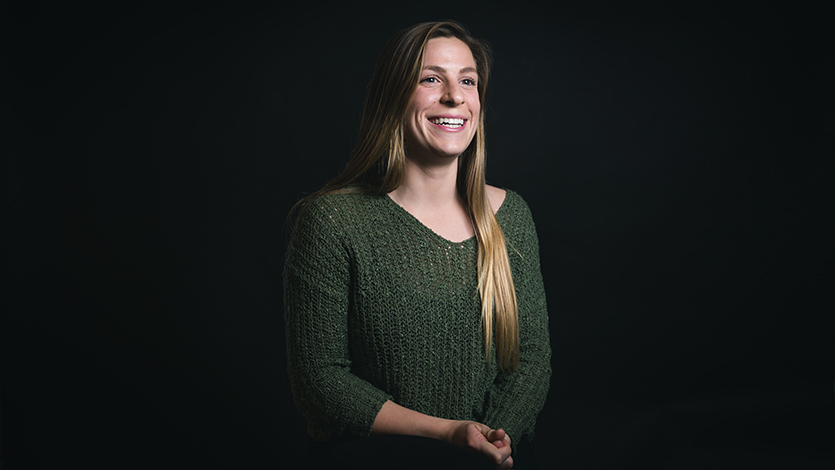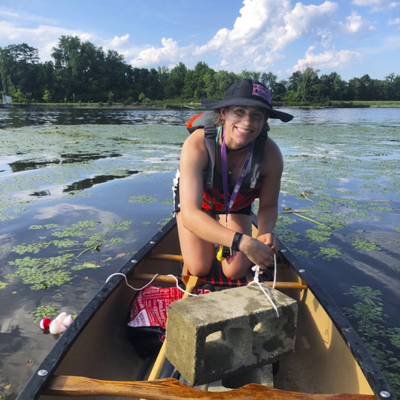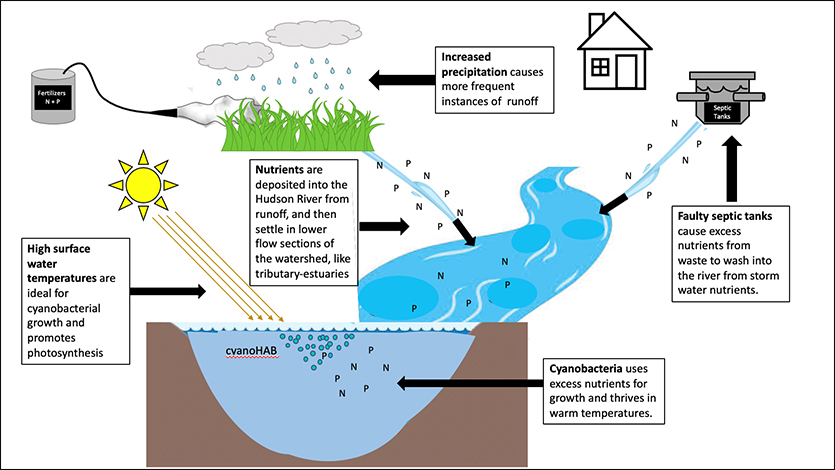Honors at Marist: A “Broader, Deeper, and More Complex Education”

Honors Program student Ellie Petraccione ’20 is using her senior research thesis to communicate why non-scientists should care about protecting the environment.
December 5, 2019—Ellie Petraccione ’20 knows that scientific research can be intimidating to non-scientists, and it can be hard for them to connect it to their own lives. Fortunately, Marist’s Honors Program has given her a platform help them make the connection, and she has devoted her Honors Thesis to translating her scientific research on the Hudson River into a digital format that can be readily understood by all. Petraccione hopes the result of her work will be more people taking action to protect the quality of life in the beautiful Hudson River Valley.
Petraccione applied to Marist’s Honor’s Program her sophomore year because she had heard good things. For example, the program is not just for liberal arts majors, and the senior thesis doesn’t have to be tied to one’s major. Says Petraccione, “I loved the idea that the Honors Program focused on seminars and special projects. It’s more work, but there are so many opportunities for really high-level intellectual exploration.” As a science major in the Honors Program, Petraccione is able to exchange perspectives with students from other academic disciplines and finds it a “really cool challenge” to communicate scientific research in a way that’s understandable to them. She adds, “The interdisciplinary aspect of the Honors Program is so nice; I’ve met so many people I wouldn’t have met otherwise.”

The Schenectady, New York native originally became familiar with Marist through lacrosse (she plays on the College’s Division I women’s team) and decided to attend because of her interest in the Physician Assistant program. However, her academic explorations soon led her to change her major from biology to environmental science. Former Honors Program Director James Snyder noticed Petraccione’s great interest in the environment, and he encouraged her to develop that interest further by pursuing an environmental science pathway. Observes Snyder, “Ellie is not a straightforward science student, even though she excels in the classroom and the lab. She has consistently expressed an interest in deeply humanistic questions that resonate with some of the most pressing social and political challenges we face today.”
Petraccione’s research focuses on the Hudson River, in particular the harmful algal blooms and cyanobacteria that have been appearing there due to climate change. The Hudson contains a great deal of agricultural runoff, and bacteria thrives in this nutrient-rich environment, hurting water quality. Petraccione’s Honors Thesis, The Causes and Impacts of Harmful Algal Blooms in Our Local Waters, seeks to bring her research to life by transforming it into digital art. Through photos, infographics, and bullet points, the project helps laypeople easily understand the problem of algal blooms on the Hudson River watershed and how it can affect their everyday lives. Among Petraccione’s findings: Research and education on the Hudson River could become more difficult. Children may not be able to fish or kayak in affected areas. Algal mats could interfere with reservoir operations, resulting in economic losses and increased taxes.
Assistant Professor of Environmental Science Zion Klos and adjunct instructor Lucy Holtsnider are overseeing Petraccione’s work, with Klos supervising the scientific research and Holtsnider advising on how to make that research approachable to a general audience through artistic forms. Notes Klos, “Ellie’s abilities in scientific research are equally matched with her exceptional drive and determination to communicate her findings. It has been a real thrill working with Ellie as she works to figure out how she can move her abilities and passions forward through these projects that start her on a career focused on both researching the science and making the science matter.”

The Honors Thesis at Marist is an independent study completed with the guidance of a faculty mentor, providing the freedom to explore meaningful questions and solve problems of personal, local, and global significance. The central issue Petraccione set out to solve is how to get people’s attention when it comes to environmental degradation. She admits, “Sometimes it’s a struggle to get people to care about climate change because it’s such a huge problem. I want to empower people to feel like they can actually contribute to the solution, for example by checking septic tank levels every year, not using fertilizers and pesticides on their lawns, and electing officials who care about water quality.” Snyder adds, “Ellie is willing to take risks with her education, especially when they align with values she holds about the environment. In this respect, she is the epitome of a Marist Honors Program student – she has pursued an education that is broader, deeper, and more complex. She really impressed me with her choice of thesis project, a project that bridges her interests in the sciences and in the arts.”
As Petraccione approaches graduation, she is grateful for professors who have been both great mentors and sources of inspiration during her educational career. In addition to Snyder, she also credits Klos with influencing her educational journey at Marist, directing her toward opportunities and supervising her research. “Dr. Klos really knows how to leverage the Hudson River to help us learn. His ecology class has lots of field work, and he showed us how to do lots of different sampling methods. When you’re out on the river in waders, you really connect to the environment, and that’s why I want to protect it. I want people to care.” After graduating from Marist, Petraccione plans to take a gap year to get more field experience before completing a doctorate and possibly becoming a professor. As she observes, “I’m definitely not done with school. I want more.”

Detail from Petraccione’s Honors project



